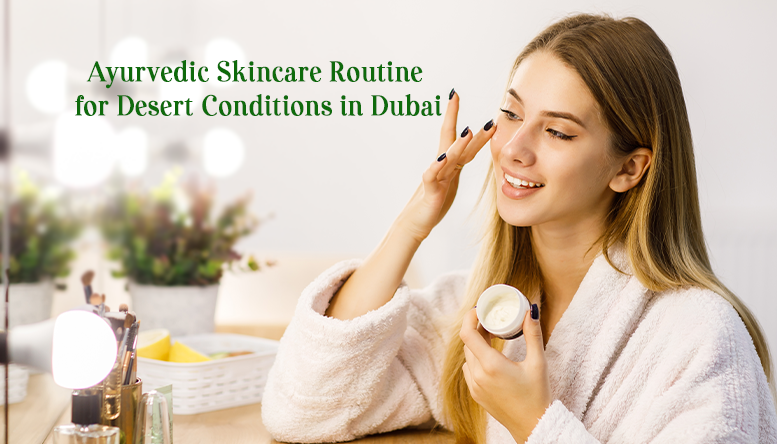
Living in Dubai’s desert climate requires proactive skin care to combat severe dryness, harsh sun exposure, and constant dust, while also preventing skin diseases. A natural skincare routine, that too with Ayurvedic essence, offers you relief and a long-term transformation as well. Ayurveda adapts to your body's constitution (dosha) and local environmental conditions, making it highly relevant to life in the UAE.
According to Ayurveda, individuals fall under three primary doshas, each with distinct traits and skin tendencies:
Vata (Air + Ether): Characterized by thin, dry, and delicate skin that tends to lose moisture quickly, especially in arid environments.
Pitta (Fire + Water): Typically has oily or combination skin, with a tendency toward redness, sensitivity, rashes, and sunburn.
Kapha (Earth + Water): Known for thick, oily skin that can become easily congested and appear dull without proper care.
A key to a successful Ayurvedic skincare routine is knowing your dominant dosha and adjusting your practices to restore balance.
Desert environments are harsh. Low humidity, high UV exposure, and dust storms are daily realities. The harsh conditions drain your skin of its natural oils, exposing it to aging, pigmentation, and irritation.
Ayurveda doesn’t rely on generic solutions that seem to fit all. Instead, it emphasizes individualized care, seasonal awareness, and the use of locally available herbs and oils.
Your day starts with exposure to heat and pollutants. So, here is how to prepare your skin the Ayurvedic way:
Oil Pulling (Gandusha): Start with this oral detox to eliminate toxins that affect skin health.
Mild Cleansing with Natural Powders: Use a mix of chickpea flour, turmeric, and neem to gently cleanse the skin, effectively removing impurities while preserving its natural pH balance.
Rose Water as a Toner: This natural cooling agent helps minimize pores and calms irritated or inflamed skin.
Moisturizing with Kumkumadi Tailam: This Ayurvedic facial oil deeply hydrates while improving complexion. Ideal for dry Dubai weather.
Natural Sunscreen: Make a DIY sun protection mix using aloe vera gel and sandalwood powder. For daily outdoor exposure, complement it with a mineral-based SPF.
During work hours or errands, the heat can intensify. A few natural practices can help:
Hydrating Spritz: Keep a mist bottle of vetiver or lavender water. Spray on your face every few hours.
Face Blotting with Multani Mitti (Fuller’s Earth): A light dab using this clay can reduce excess oil without drying your skin.
Dietary Tips: Ayurveda links digestion and skin health. Eat cooling foods like cucumber, coconut water, and mint-based drinks.
Sunset is when your skin shifts into repair mode, and Ayurveda encourages a calming ritual:
Oil Massage (Abhyanga): Apply warm sesame or almond oil on your body. Focus on feet, arms, and neck for better sleep and improved circulation.
Ubtan Mask: You may combine these easily available items such as turmeric, yogurt, and sandalwood into a paste. Apply weekly for brightening and anti-inflammatory benefits.
Aloe Vera Gel Application: Apply fresh aloe vera to sun-exposed areas to soothe and hydrate.
Sleep Hygiene: Use calming scents like jasmine or chamomile in your room. A sound sleep might feel like far better than any cream.
Let us have a closer look at ingredients that work wonders in desert climates:
Khus (Vetiver): Serves as a natural cooling agent that calms overheated skin and balances the Pitta dosha, which is prone to flare-ups during hot weather.
Sandalwood: With its anti-inflammatory and antiseptic properties, sandalwood soothes sunburn, cools redness, and restores a feeling of comfort to overheated skin.
Licorice Root: This herbal plant naturally lightens the skin, minimizes pigmentation, and is especially useful for individuals suffering from sun damage and dark spots.
Ashwagandha: This adaptogenic herb assists the skin to adapt to stress by fortifying the skin's barrier and enhancing resilience against environmental stressors.
Manjistha: Ayurveda's intense blood cleanser, manjistha detoxes the skin internally, resulting in better clarity, less acne, and increased natural radiance.
Most importantly, always patch-test herbal ingredients, especially in arid climates where your skin can be extra sensitive.
Drinking 8 glasses of water may not be enough in a place like Dubai. Ayurveda promotes hydration in a more specific way:
Infused Waters: Add fennel, coriander, or mint to your water.
Herbal Teas: Chamomile, tulsi, or hibiscus teas aid digestion and skin clarity.
Oil Intake: Healthy fats like ghee or flaxseed oil improve skin moisture from the inside.
Good skin is not just about what you apply externally. Ayurveda encourages a balanced life. Here are supportive lifestyle habits:
Wake Early (Before Sunrise): Syncing with nature helps regulate hormones and improve skin tone.
Pranayama & Yoga: Deep breathing and stretches detoxify and oxygenate skin cells.
Avoid Hot Showers: They strip natural oils; go for lukewarm baths instead.
Cover Up When Outdoors: Use cotton scarves or hats to physically shield your skin.
Dubai’s seasons may be subtle, but your skin still feels the shift. Ayurveda encourages minor changes to match the whether of the place:
Summer: The heat is intense this period, and Pitta levels rise. Focus on cooling herbs like rose and vetiver, switch to light oils like coconut, and don’t skip natural sun protection. Hydrating mists and aloe vera gels work well to calm overheated skin.
Winter: The air gets drier, increasing Vata. Use heavier oils like sesame or almond, moisturize more often, and include warming herbs like turmeric in masks. Gentle oil massages can keep your skin soft and nourished.
DIY skin care is good, but in case of persistent problems like eczema, hyperpigmentation, or hormonal acne, a qualified Ayurvedic physician like from Dr. Jasna’s Ayurveda Clinic can offer the best Ayurvedic treatment in Dubai. This usually involves internal cleansing (Panchakarma), some dietary adjustments, and a well-customized herbal application.